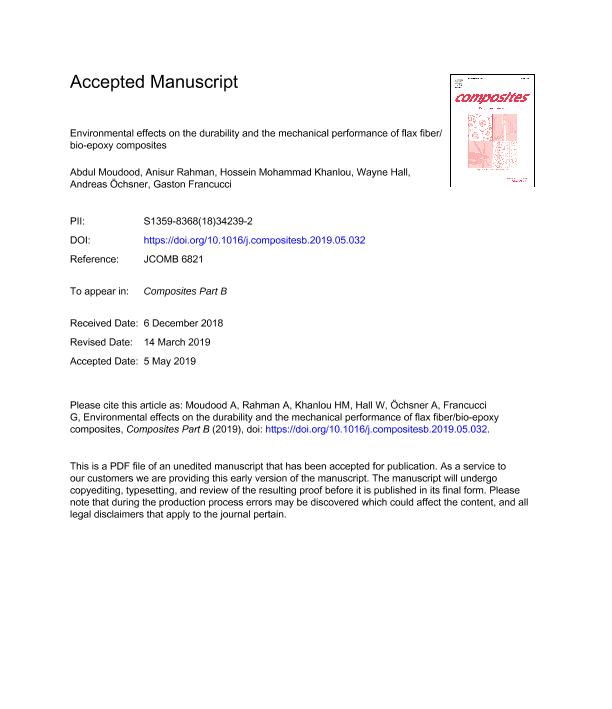Mostrar el registro sencillo del ítem
dc.contributor.author
Moudood, Abdul
dc.contributor.author
Rahman, Anisur
dc.contributor.author
Khanlou, Hossein Mohammad
dc.contributor.author
Hall, Wayne

dc.contributor.author
Öchsner, Andreas
dc.contributor.author
Francucci, Gaston Martin

dc.date.available
2020-11-24T17:58:24Z
dc.date.issued
2019-08
dc.identifier.citation
Moudood, Abdul; Rahman, Anisur; Khanlou, Hossein Mohammad; Hall, Wayne; Öchsner, Andreas; et al.; Environmental effects on the durability and the mechanical performance of flax fiber/bio-epoxy composites; Elsevier; Composites Part B: Engineering; 171; 8-2019; 284-293
dc.identifier.issn
1359-8368
dc.identifier.uri
http://hdl.handle.net/11336/118908
dc.description.abstract
The growing usage of bio-composite materials in different engineering applications demands a thorough understanding of their performance during their service. Extreme environmental conditions, such as warm, humid, and freezing environments, among others, can degrade the mechanical properties of the bio-composites when they are exposed to harsh environmental conditions. In addition, the use of these composites in underwater applications can also shorten their life cycle. In this work, the durability and mechanical performance (tensile and flexural behavior)of flax/bio-epoxy composites exposed to different environmental conditions were evaluated. These conditions were chosen to replicate those found outdoors that can affect the durability of these materials: water immersion, warm humid environment and freeze-thaw conditions. Moisture and water absorption behavior were evaluated and the water content (or exposure time)was related to the physical changes and mechanical properties. Results show that the mechanical properties of flax/bio-epoxy composites are clearly degraded by water ageing when they are compared to the ?as manufactured? composites. The tensile strength and modulus is decreased approximately by 9% and 57%, respectively for water saturated (immersed in water until saturation)samples compared to as manufactured samples. On contrary, this reduction rate is only 0.8% and 3%, respectively in case of humidity saturated (exposed to humid environment until saturation)samples. Furthermore, water incurred more severe effects on the flexural properties of the composites, since their flexural strength and modulus is decreased by 64% and 70%, respectively, as compared to as manufactured samples. It was found, however, that these properties can be partially regained after drying the water aged composites. Warm humid environments and freezing-thawing cycles have very little effect on the bio-composites.
dc.format
application/pdf
dc.language.iso
eng
dc.publisher
Elsevier

dc.rights
info:eu-repo/semantics/openAccess
dc.rights.uri
https://creativecommons.org/licenses/by-nc-nd/2.5/ar/
dc.subject
A. FLAX FIBER COMPOSITES
dc.subject
B. PHYSICAL PROPERTIES
dc.subject
C. MECHANICAL TESTING
dc.subject
E. VACUUM INFUSION
dc.subject.classification
Compuestos

dc.subject.classification
Ingeniería de los Materiales

dc.subject.classification
INGENIERÍAS Y TECNOLOGÍAS

dc.title
Environmental effects on the durability and the mechanical performance of flax fiber/bio-epoxy composites
dc.type
info:eu-repo/semantics/article
dc.type
info:ar-repo/semantics/artículo
dc.type
info:eu-repo/semantics/publishedVersion
dc.date.updated
2020-11-18T16:46:31Z
dc.journal.volume
171
dc.journal.pagination
284-293
dc.journal.pais
Países Bajos

dc.journal.ciudad
Amsterdam
dc.description.fil
Fil: Moudood, Abdul. Griffith University; Australia
dc.description.fil
Fil: Rahman, Anisur. Griffith University; Australia
dc.description.fil
Fil: Khanlou, Hossein Mohammad. Griffith University; Australia
dc.description.fil
Fil: Hall, Wayne. Griffith University; Australia
dc.description.fil
Fil: Öchsner, Andreas. Hochschule Esslingen; Alemania
dc.description.fil
Fil: Francucci, Gaston Martin. Consejo Nacional de Investigaciones Científicas y Técnicas. Centro Científico Tecnológico Conicet - Mar del Plata. Instituto de Investigaciones en Ciencia y Tecnología de Materiales. Universidad Nacional de Mar del Plata. Facultad de Ingeniería. Instituto de Investigaciones en Ciencia y Tecnología de Materiales; Argentina
dc.journal.title
Composites Part B: Engineering

dc.relation.alternativeid
info:eu-repo/semantics/altIdentifier/url/https://www.sciencedirect.com/science/article/pii/S1359836818342392
dc.relation.alternativeid
info:eu-repo/semantics/altIdentifier/doi/http://dx.doi.org/10.1016/j.compositesb.2019.05.032
Archivos asociados
